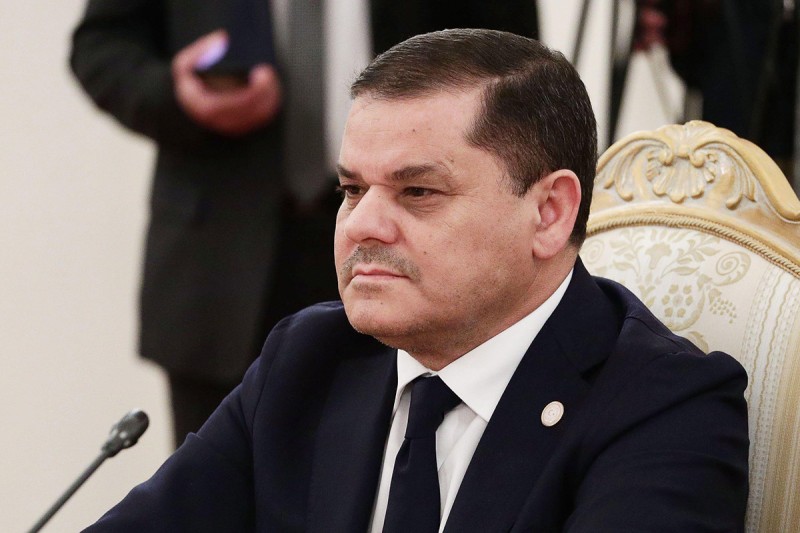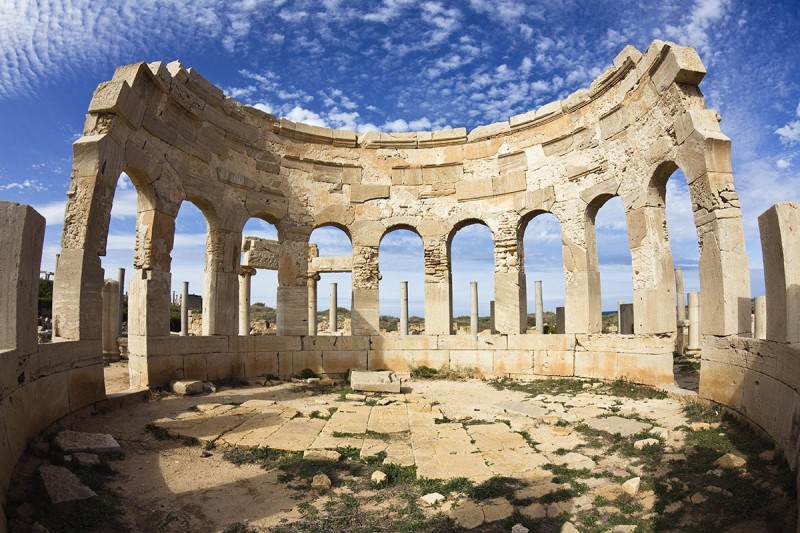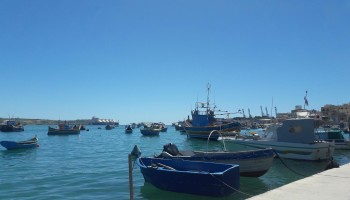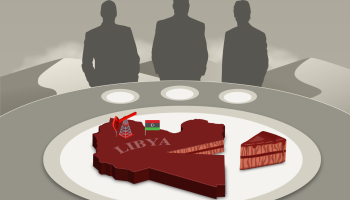It was the late 2000s, and Muammar Gaddafi was thinking big: A new auditorium for a Benghazi cultural center, the restoration of ancient Greek ruins, and a water treatment plant in the heart of the desert.
Flush with oil cash, and with the West finally warming up to him after decades spent as an international pariah, the Libyan dictator had planned development projects across the country to be funded with billions of dollars in state revenues.
Most of these projects would be managed through a state-run company known as the Organization for Development of Administrative Centers, or ODAC, which handled public infrastructure contracts. The aim, at least on paper, was to develop infrastructure and improve quality of life across the country through generous government spending.
But over the years, it became an open secret that this system was also a conduit for graft and embezzlement by top officials connected to Gaddafi. After he was deposed and killed during Libya’s 2011 uprising, investigations into ODAC confirmed what many had long suspected: Billions of dollars given out through public contracts had gone missing. Investigators said the money appeared to have been stolen by the former head of ODAC, Ali Ibrahim Dabaiba, and his family.
An investigation by OCCRP and its partners, drawing on leaked data from inside Swiss banking giant Credit Suisse, has discovered previously unknown accounts belonging to Dabaiba and three other businessmen who benefited from the public contracting system.
These clients, all of whom were later implicated in corruption investigations, were involved at all levels of the public construction sector, from the awarding of contracts to the ownership of companies that benefited from the government spending. One was a Libyan bank in Tunisia allegedly used in a graft scheme involving letters of credit issued for ODAC contracts.
Their Credit Suisse accounts were worth tens of millions of dollars while they were open — in some cases, during the same years their owners were working with Dabaiba to loot the ODAC. All remained open after the 2011 Libyan uprising brought the country’s development system under renewed scrutiny, and after Dabaiba was placed on a national sanctions list.
The Suisse Secrets Investigation
Suisse Secrets is a collaborative journalism project based on leaked bank account data from Swiss banking giant Credit Suisse.
Credit Suisse said it has strict controls in place to combat tax evasion and money laundering, both in Switzerland and abroad. The bank declined to comment on specific clients, but said it has always followed the laws of the time, and over the past decade has invested considerably in combating financial crime.
“Credit Suisse strongly rejects the allegations and inferences about the bank’s purported business practices,” it said in a statement. “The matters presented are predominantly historical … including at a time where laws, practices and expectations of financial institutions were very different from where they are now.”
ODAC and the public contracting process were part of a broader system of corruption that was used to siphon off Libya’s vast oil wealth during Gaddafi’s four decades in power. A 2014 report by anti-corruption watchdog Transparency International found that his regime likely stole around US$61 billion.
James Shaw, a U.N. expert advising on asset recovery and Illicit financial flows, said this pillaging of state funds left the people of Libya without many basic necessities, including essential healthcare and education resources.
“Humanitarian needs cannot be placed on hold while waiting for the political process (elections) to resolve itself,” he wrote in an email. “People need dialysis machines now. Schoolchildren need schoolbooks now.”
Last year Dabaiba’s brother-in-law and cousin, Abdulhamid Dabaiba, became Libya’s interim prime minister. Abdulhamid Dabaiba was previously the head of state-owned development contractor LIDCO, which was part of ODAC’s contracting system. After Gaddafi’s fall, both Dabaibas were sanctioned for corruption by Libya’s new transitional government.
Since becoming prime minister, Abdulhamid has reportedly become embroiled in a dispute with Parliament over his budget demands to build new infrastructure projects. Dabaiba’s government is now moving to scrap the sanctions list.
“There are … justified fears that cronies associated with [Abdulhamid] Dabaiba would use investment projects to siphon off profits through commissions or other methods,” wrote Wolfram Lacher, a senior associate at the German Institute for International and Security Affairs, in a recent paper.
“After all, Dabaiba represents a network that is notorious for doing just that.”
Dabaiba’s Legacy
Arab Spring protests spread to Libya in February 2011 and quickly turned violent. A NATO intervention provided the rebels with air support and six months later they had taken the capital. Gaddafi was captured and killed in October.
It wasn’t long before ODAC faced its own reckoning.
In August 2011, as rebel forces advanced on Tripoli, the European Union froze the company’s assets, calling it an "entity acting on behalf of, or at the direction of” Gaddafi’s regime and a “potential source of funding” for his government. The sanctions remained in place until early 2013.
In 2012, after Gaddafi’s fall, Libya’s new government conducted an audit of ODAC. They suspected that Ali Ibrahim Dabaiba, who had run the company for over two decades, may have embezzled as much 9 billion dinars (about $7 billion at 2011 rates) from contracts that the agency had issued under his leadership. Libyan auditors found that most ODAC contracts had been awarded without public tenders, and letters of credit were extended to companies not involved in the contracts they covered.
Dabaiba, born in 1945, worked as a geography teacher before becoming mayor of the coastal city of Misrata for Gaddafi’s party after the dictator seized power in 1969. He became the chairman of ODAC in 1989, and kept the position until the 2011 uprising. In both positions, he would have been classified as a politically exposed person, requiring banks to subject him to extra scrutiny.
The interim Libyan government in 2012 added Dabaiba to a list of sanctioned officials whose assets should be frozen. The chaos of Libya’s civil war means they were never properly enforced, however, and Dabaiba’s assets appear to have been left untouched. Authorities are now trying to scrap the list, which also includes Libya’s current interim prime minister, Abdelhamid Dabaiba, who is Ali Ibrahim Dabaiba’s cousin.
Ali Ibrahim Dabaiba was also the subject of an Interpol red notice in 2014 after Libya’s attorney general launched a criminal investigation into the former ODAC head, but it was removed the following year. A news report said Dabaiba was arrested in 2014, but images posted on Facebook in 2020 and last year appear to show him and his sons living free in Libya.
During his time at the helm of ODAC, Dabaiba used a vast network of bank accounts and offshore companies, registered in Cyprus and elsewhere, to channel money out of the country, a 2018 OCCRP investigation found. Libya’s authorities said that he awarded tenders to companies he secretly owned or controlled, and gave advance payments for contracts that were never implemented.
“Controls were poor and there was no check on the conduct of high officials affiliated with Gaddafi,” they said.
OCCRP’s previous investigation showed that Dabaiba held at least two Credit Suisse accounts in 1998, which posted millions of dollars’ worth of transactions.
The newly leaked banking data shows that Dabaiba also opened another account with the Swiss bank in August 1990 that remained open until August 2012, a year after the fall of Tripoli. At its maximum balance, in November 2009, it held 176,527 Swiss francs ($175,769), the banking data shows.
OCCRP found that Ali Ibrahim Dabaiba’s son, Ibrahim Ali Dabaiba, also held a Credit Suisse account jointly with Costa Rican company Cold Harbor Advisors S.A. In official filings, the company’s president is listed as Bernal Zamora Arce, a well-known frontman in Costa Rica linked to multiple companies registered there and in Cyprus.
The account in Ibrahim Ali Dabaiba and Cold Harbor’s name was opened in 2007, the year after the company was founded, and reached a maximum balance of nearly 19 million Swiss francs ($16.76 million) that December.
Both Ali Ibrahim Dabaiba and his son were named in a request for international assistance that Libya sent to Scotland in 2013 seeking help tracing looted state funds. According to reporting from The Guardian, their luxury properties in the United Kingdom are worth over 25 million British pounds ($36.48 million). By the time officials sought help, both of the aforementioned Credit Suisse accounts had been closed. But accounts held at the bank by their business associates remained open for years.
Alubaf Bank
A Profitable Heritage
On Libya’s northeastern Mediterranean shores lie the ruins of Ptolemais, an ancient Greek city first settled around the seventh century B.C. In 2020, Libya applied to have it listed as a UNESCO World Heritage Site.
In 2008, a Scottish company called Marco Polo Storica won an ODAC contract to work on the site, and another to restore several of Libya’s other historical wonders, including the Roman ruins of Leptis Magna in the country’s northwest. The two contracts were worth a total of 360 million Libyan dinars ($278 million).
In the 2013 request for assistance from the U.K., Libyan authorities said they suspected that Marco Polo Storica was controlled by Ali Ibrahim Dabaiba’s brother through an offshore company registered in the British Virgin Islands.
They alleged that Marco Polo Storica came to hold “assets rightfully belonging to the State of Libya” which had been misappropriated by Dabaiba and his brother. But by September 2011, Marco Polo Storica had come to be majority-owned by a British-Libyan businessman named Riad Suleiman Grada.
The Libyan investigation concluded that Grada acted as a frontman to conceal the Dabaibas’ ownership of companies — saying he played “an important role in the Dabaibas’ conspiracy to defraud the State of Libya.” (Under Libyan law at the time, a civil servant such as Dabaiba should not have been involved in private companies at all — especially if they related to his work.)
It’s unclear what happened to the investigation into Marco Polo, but throughout the period that Grada ostensibly owned the company, he held at least four Credit Suisse accounts. Some remained open for years after the fall of Gaddafi.
One account, which was opened in May 2007 and held 1.6 million Swiss francs ($1.38 million) by a month later, stayed open until May 2016. Two others were opened in 2008, and a fourth one the following year. The account with the highest maximum balance contained nearly 41 million Swiss francs ($37.78 million). It’s unclear if these have been closed.
Despite his links to Dabaiba and the fact that his uncle was a general in Gaddafi’s army, Grada — who did not respond to requests for comment — banked with Credit Suisse for close to a decade.
And he wasn’t the only one of Dabaiba’s business partners to hold an account at the Swiss bank. So too did a Libyan named Ahmed Lamlum.
LAFICO: The Iron Bank
The Lamlum Accounts
Ahmed Lamlum and Ali Ibrahim Dabaiba were longtime business associates — which, for them, often meant turning public development money into private gain.
Lamlum helped Dabaiba set up and maintain the empire of offshore companies he used to embezzle ODAC funds. The two shared a real estate agent in Switzerland, as well as family ties through the marriage of Dabaiba’s daughter to Lamlum’s nephew.
Lamlum, who died in 2014, had at least eight Credit Suisse accounts in his own name, many held jointly with family members, OCCRP and its partners found. The oldest of these accounts was opened in 1989. The largest account reached over 12.4 million Swiss francs ($8.88 million) in August 2003.
“That bank had Libyan public money in its coffers,” said a source with knowledge of some of the corrupt deals, who spoke on condition of anonymity citing fears about his personal safety.
Lamlum’s accounts were open during a period when he was helping administer a network of offshore companies linked to Dabaiba. These included a Cyprus-registered company named Fabulon Investments, which listed Dabaiba variously as an employee and director, and which was later owned by Lamlum.
Fabulon played a central role in funneling stolen money out of Libya. One contract it won from the agency in the late ’90s, to build a water treatment plant in the central region of Al Jufra, shows how this worked.
Leaked invoices show that between 1997 and 1998, while Dabaiba was both Fabulon’s director and the head of ODAC, the company invoiced the agency for over half a million British pounds (over $800,000).
Then, later in 1998, Dabaiba’s older Credit Suisse account received two payments of 50,000 Swiss francs each from a company in the same corporate structure as Fabulon, which was also controlled by Dabaiba and Lamlum.
A lawyer representing the Lamlum family confirmed that Ahmed Lamlum had a role in Fabulon Investments but denied that he had been involved in any corrupt dealings, describing reporters’ questions as “incorrect and misleading.”
Lamlum’s “business activities have always been lawful and tax compliant,” said the lawyer. “It seems likely that all banks he has worked with have made sure they could do so without violating any laws and regulations applicable at the time they were in contractual relations.”
Fabulon partnered on the project with a U.K.-based company called Naston, which specialized in water treatment. The British company appears to have worked frequently with Fabulon — one email from June 2000 shows the pair had three ongoing projects together worth more than 10.3 million British pounds ($15.48 million). Naston’s website says it has built three sewage treatment plants in Al Jufra.
Leaked emails also show Lamlum frequently discussed how Naston could obtain letters of credit for the plant from the ODAC. These letters, which guarantee payment of invoices if the deal falls through, were one of the key methods used by corrupt officials to steal Libyan state funds.
The Libyan government’s 2012 audit of ODAC found numerous issues with the system, including that irrevocable letters of credit were addressed to people or companies not even involved in the contracts.
During the Al Jufra project, Lamlum exchanged emails with Naston employees about arranging a letter of credit for the Al Jufra plant project from ODAC, including raising the question with Dabaiba. In one email, Lamlum discusses applying using one of “Naston’s associated companies in Cyprus,” adding: “We have an existing company which we can use for this purpose.”
Naston ceased to exist in 2017. The former company directors either could not be reached, or did not respond to a request for comment.
Paul Donowitz, strategy lead for natural resource governance at Global Witness, said that misappropriation of letters of credit was “absolutely predation.”
“We would argue the international financial system is complicit through weak due diligence and money laundering laws for cross-border trade,” he said. This leaves the system “wide open to fraud and abuse.”









